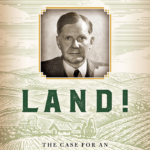 Readers of FPR will be readily forgiven if they have yet to reserve any time this year to celebrate the 500th anniversary of John Calvin’s birth. (If you are tempted, the day is July 10.) From Max Weber and the Protestant work ethic to Robert Merton and the scientific revolution, Calvinism has received much credit for fueling the sort of economic and intellectual achievements that make the modern world GO! And since modernity has created conditions that render small towns, neighborliness, and front porches implausible if not quaint, the subjects of the French Reformer, who labored almost his entire career in Geneva, and localism rarely co-exist.
Readers of FPR will be readily forgiven if they have yet to reserve any time this year to celebrate the 500th anniversary of John Calvin’s birth. (If you are tempted, the day is July 10.) From Max Weber and the Protestant work ethic to Robert Merton and the scientific revolution, Calvinism has received much credit for fueling the sort of economic and intellectual achievements that make the modern world GO! And since modernity has created conditions that render small towns, neighborliness, and front porches implausible if not quaint, the subjects of the French Reformer, who labored almost his entire career in Geneva, and localism rarely co-exist.
Those interested in Calvinism, whether by scholarly interest and or religious conviction, are not showing restraint in celebrating a man who was so opposed to such commemoration that he forced Geneva’s authorities to bury him in an unmarked grave (which has yet to be marked). At the end of may, the University of Geneva hosted the International Congress for Calvin Studies for three days of remarkable presentations by leading scholars from Europe, Africa, and North America. Next month, American Presbyterian church leaders are sponsoring another conference which mixes scholarly talks with real sermons to enlighten and inspire those lay people whose investments did not go entirely south last fall. (Yes, this is a version of Protestant pilgrimage; the sessions will actually be held in St. Peter’s Cathedral where Calvin preached and administered the sacraments for the better part of three decades.)
Both groups responsible for these conferences have not shied away from attributing to Calvin many of the so-called blessings of the modern world – democracy, capitalism, and education for starters. These attempts to trace influence are less becoming intellectually among academics who should know better than to attribute to any single-cause the sort of social complexity and differentiation that we experience daily. (It could be the case that Calvinism flourished in settings where economic engines were already churning rather than belief being responsible for economic dynamism.) And yet, pride is especially unattractive among those who are supposed to know the pitfalls of this sin. Consequently, when Abraham Kuyper, a full-throttled Calvinist who flared to become the Prime Minister of the Netherlands at the beginning of the twentieth century, boasted before American Presbyterians in 1898 that every competent historian knew that “Calvinism has led public law into new paths, first in Western Europe, then in two Continents, and today more and more among all civilized nations,” some contemporary Calvinists wince. Aside from the issue of pride and single-cause analysis, remarks like Kuyper’s demonstrate a naivete about the West and its achievements, especially if those accomplishments inevitably come with an outlook that regards convenience and the lowest price as signs of cultural advance.
As already mentioned, Kuyper was not the only one to portray Calvinism as a religion that fires social and economic progress. H. Richard Niebuhr’s much-cited work, Christ and Culture, ran through five options on how cult and culture relate, and Calvinism was among western Christians the one faith that could move mountains, not to mention profits. (Since Calvin himself encouraged Christians to pray after meals that they “not become too deeply attached to earthly and perishable things,” it is fair to wonder whether Niebuhr, Kuyper, Weber or even Tocqueville got Calvin right.)
As I sat at the May conference in Geneva and heard presentations on the social and political consequences of Calvin – contributing to the mix with my own paper on American Presbyterian boasting about Calvinism and political liberty – I couldn’t help but wonder if historians and the devout were looking for Calvin’s legacy in all the wrong places. After all, I was sitting in Geneva, a city that is part of Switzerland, and which takes a back seat to Bern and Zurich in the nation’s political and religious history. And yet, scholars kept tracing Calvinism’s influence to everywhere but Switzerland and its admirable history. Kuyper himself credited Calvinism with Dutch independence, the Glorious Revolution of 1688, and the founding of America. If you like political events with international consequences, then the colonial powers of the Netherlands and Great Britain, as well as the super-power of super-powers – the United States of America – are historical horses to which you might want to hitch your globally ambitious wagons.
But if you are fond of the original United States and the Articles of Confederation, then Switzerland may just be your cup of hot chocolate. Here is a nation that managed to do what the United States all to quickly abandoned. It is still a confederation, has an executive branch made up of a committee of seven, managed to remain neutral in two world wars, and nurtures patriotism by requiring all men to serve in the military (as well as the reserves until the age of 42). Granted, its economy is not flashy – consisting of banks, watches, pocket knives and chocolate. But it is a nation with truly independent instincts and the collective wits to preserve Swiss autonomy.
Of course, Switzerland is not a utopia, and its policy of neutrality during World War II has a fair share of detractors. The point here, however, is not to paint Switzerland as the answer to the world’s problems. It is instead to wonder aloud if Calvinists and those who study Calvinism should look for the fingerprints of John Calvin’s influence not across the English Channel or across the Atlantic Ocean or anywhere for that matter outside Switzerland. I know my own Protestant convictions would feel more comfortable in Switzerland’s political shoes than with the global footprint for which the United States is now responsible. Perhaps, if American Calvinists can find their confederated selves during this year of Calvin festivities, they might show their American neighbors that places like Switzerland are more worthy of our political admiration than supposedly successful nations like the United States. If John Calvin gets credit for a renewed interest in national restraint and real political independence, so much the better.






12 comments
Clare Krishan
Interesting localism angle to the banking secrecy thingummy over at the DailyKos:
http://www.dailykos.com/story/2009/6/11/741373/-Is-it-all-funny-money
Why not communitarian money ?
“On a practical level, money has a practical function: it allows the goods and services produced by labor to be traded. So why not a money system where each group within working class would have direct control over the printing, availability, and value of money? I suppose there would still be counterfeiting under such a system, though with a lot of small money systems there would be a lot less motivation to counterfeit money, as well as a lot more EMPOWERED public outrage about the counterfeiters.
If I know that my group and I have made a conscious decision to back the value of our money, rather than having an externally-directed money economy shoved down our throats (pretty much the situation now), then I’m more likely to be able to do something about economic problems (eg counterfeiting), because I would be able to do something about them.”
Allan
“Next month, American Presbyterian church leaders are sponsoring another conference which mixes scholarly talks with real sermons to enlighten and inspire those lay people whose investments did not go entirely south last fall. (Yes, this is a version of Protestant pilgrimage; the sessions will actually be held in St. Peter’s Cathedral where Calvin preached and administered the sacraments for the better part of three decades.)”
Finally someone said it. Thank you DGH. Why is this not seen as worldliness by those who have been ordained to lead Christ’s sheep? At the risk of being called an egalitarian anti-elitist, so much of these conferences comes across as just a country-club for academics. I am all for educated ministers to the highest degree (as opposed to evangelicalism’s downplaying of educated ministers) but something seems missing in the biblical ethic of ministers/christians given gifts/being educated to serve Christ’s people. It is difficult to see these conferences as something other than academics serving themselves and those who can afford the costs of attendance.
John Médaille
I have no Presbyterian enemies that I am aware of, or at least no enemies who are such because they are Presbyterian and I am not; they have found other and more valid reasons to take exception to my character.
dgh
I don’t suppose John M. is apologizing to his Presbyterian enemies.
The point of the piece was that Calvin’s defenders and detractors each engage in global as opposed to local readings of the Reformed tradition. But if you applied a localist outlook, then you might try to look for connections between Calvin and Geneva and Switzerland, rather than Queen Wilhelmina, the defeat of the Spanish Armada, Massachusetts Bay Colony, or Holland, Michigan.
And this, of course, raises all sorts of questions about various Christian efforts to tie the “West” — a very anti-local notion — to any branch of the church.
Clare Krishan
gotta love the italian flourish accusing the Swiss of money laundering:
http://www.ilgiornale.it/a.pic1?ID=356715
“producing phantasmagorical utility” … well indeed, if its useful to us because we say its valid, who cares if its legitimate? Its US 134.5 billion, after all…
What a parable for the times
Clare Krishan
Swiss bank secrecy would certainly be helpful
http://www.asianews.it/index.php?l=en&art=15456&size=A
if you wanted to dump US securities before the rest of the world, right?
Absolutes or relatives, that is the question…
Steve Nicoloso
Indeed. Switzerland is not the way it is because of Calvin, but no doubt in spite of him and, more to the point, his intellectual heirs, who had far more success in erecting their various totems in lands far removed from the “stifling” influence of medieval traditions.
Or attributing morbid political forms to our least favorite theology. Heh! But I don’t think this is necessarily so. Ideas do actually have consequences. Liberal democracy arose naturally where it arose, and was quite successful (or less morbid) where it arose, because of Calvinism. By way of contrast, the morbidity of liberal democracy was almost immediately apparent (at least to those, like Burke, who payed attention) in predominantly Catholic countries. The current triumph of liberal democracy, enforced literally since WWII at gunpoint, is not so much a case of liberal democracy adapting to fit various religious and cultural backdrops, as it is one of turning the whole world (more or less, with notable exceptions) low church Protestant.
Adam Koontz
As Darryl can probably guess, I’m not much in the habit of thanking Calvinism, even “in its most virulent and successful forms,” for much of anything, which means I’ll also refrain from attributing the cigarette- and baby-hating vagaries of the modern American state to it. I do wonder, though, if attributing our favorite political forms and theories to our favorite theological forms and theories isn’t always impossibly circular. Because at least within Western Christianity, I could find someone or some group within almost any confession who at some time made the case for republican federalism, democracy, monarchy, the welfare-warfare state, etc. Without positing the existence of too many Baptist monarchists or Methodist anarchists, the multiplicity of reasons for a nation’s political forms and history is hard to reconcile with the clarity of a particular confession or theologian, as the coexistence of RC’s and Reformed in both supposedly uber-Calvinist Holland and Switzerland and the multitude of denominations in “Puritan” America shows. That’s a lot of freedom-hating papists, statist Lutherans, and heretical Quakers to account for in the histories of these Calvinist countries. Switzerland might be the way it is partly just because people wanted to and could be left alone for the most part, rather than because a Frenchman with a penchant for singing psalms said one thing or another in Book Four of his Institutes about government.
Jason Peters
“If John Calvin gets credit for a renewed interest in national restraint and real political independence, so much the better.”
If?
The Kuyperian gene is a hearty one; it has produced some cheerleaders almost as enthusiastic as Father Abraham himself. Jean Cauvin will get credit, all right. I was edumacated–at the school bearing his name–by people certain that Calvin had also appeared on the Mount of Transfiguration–along with those other three people.
But even the brilliance of Jesus is diminished in his followers. JC (the Genevan, not the Galilean) did give us the Institutes, which are certainly worth the trouble.
Apologies to all my EO and RC friends.
John Médaille
Both groups responsible for these conferences have not shied away from attributing to Calvin many of the so-called blessings of the modern world – democracy, capitalism, and education for starters.
Of course, both groups are correct. The problem is that the Calvinists might be responsible for modern democracy (which is so undemocratic), modern capitalism (which is so uneconomic), and modern mis-education. And all that is before we get to the touchy subjects of Dutch independence, the Glorious Revolution, and the founding of America.
But the Chocolate is good.
Apologies to all my Presbyterian friends.
Steve Nicoloso
In broad strokes, this is no doubt true, but why stop there? The deformations of puritanism have continued unabated and even flourished down to the present day. Even by the time of the American founding, puritanism had evolved thoroughly into congregtionalism and a healthy close cousin unitarianism, the latter of which (in practice, if not theology proper) swallowed up nearly all of mainstream protestantism; to which we can attribute abolitionism, women’s suffrage, teetotalism, prohibition of drugs and alcohol, anti-smoking statutes. It is arguably the most successful mutant social gene the world has ever known. A 16 year-old girl can get abortion (in many states) without informing her parents, but yet cannot buy cigarettes even with a note from the same. For this we can thank Calvinism, in its most virulent and successful forms.
Comments are closed.